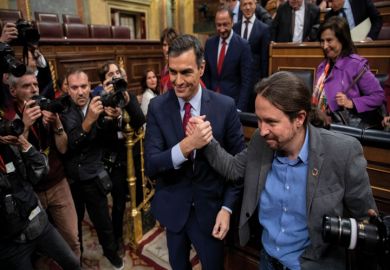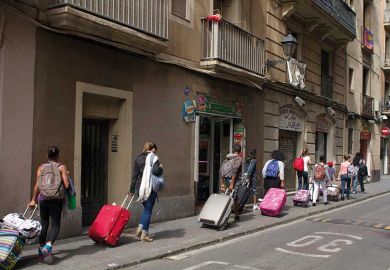Manuel Castells is probably Spain’s most internationally recognised academic. But even the University of Southern California professor, whose feted scholarship on urban sociology and communications has made him the world’s fifth most-cited social scientist, faces a tough job to fix Spain’s higher education system as he takes on the role of universities minister in Spain’s new government.
In 40 years of democracy, Spain’s primarily public higher education model has achieved the highest levels of participation in the European Union, according to the criteria set out in the Europe 2020 Strategy. However, since that strategy was approved in 2010, Spain’s achievement has been imperilled by the economic crisis and the conservative governments under Mariano Rajoy.
Deep cuts to the higher education budget were accompanied by a brutal hike in tuition and other fees. The former shot up by 30 per cent during a decade that saw a mere 2.5 per cent rise in average salaries.
Alongside this, the conservative government, under ministers who had no management experience in higher education, promoted a discourse that disparaged public universities while facilitating the creation of private alternatives.
Meanwhile, several leaders of Rajoy’s Popular Party were embroiled in scandals related to their lack of precision about – if not their outright invention of – their own university qualifications. There was even a concrete case of corruption related to a centre within a public university, which led to the resignation in 2018 of the president of Madrid’s regional government, Cristina Cifuentes.
In this context, Pedro Sánchez, Spain’s prime minister, acknowledged in his inaugural address the need to restore the reputation of Spanish public universities and to devise a plan that restores universal access without any economic discrimination. He advocated a new policy for grants and university fees that better reflects family income and argued that “grants should stop being [seen as] a handout and become a right of those people that meet certain social and academic requirements”.
Sánchez’s government is a coalition that, as well as his Spanish Socialist Workers’ Party, includes the more leftist Unidas Podemos party, founded in 2014 by political scientists from the Complutense University of Madrid. It is Podemos that was charged with appointing a universities minister, and its selection of a figure of Castells’ unquestionable merit and capacity will help rebut the campaign by conservative politicians and media to discredit public universities and will force them to take his agenda seriously.
Castells will need to figure out how Spanish universities can achieve excellence while maintaining access. The International Campus of Excellence Commission, which I chaired at the beginning of this decade, carried out the only serious external study of how this might be achieved. Rejecting the implausible idea that every city should have a university (and a football team) in the top division, it highlighted the need to establish competitive financial funding mechanisms for research, knowledge transfer and some areas of education that required structural strategic support.
Castells will not be helped by the fact that he will be responsible only for universities, while a Sánchez appointee will oversee science and innovation. These responsibilities were traditionally united under one ministry, and anyone who has had experience in government knows that there is overwhelming evidence that having the most relevant competencies under the same command structure is the best strategy.
Spain’s separation of its Ministry of Economy from its Ministry of Finance is equally crazy, but it compensates for it to some extent with a coordinating “Delegate Commission on Economic Affairs”. To date, there is no “delegate commission for knowledge” that can coordinate the three sides of the knowledge triangle, as well as all the strategic civil and military centres and funding that impact on the knowledge economy. A simple coordination between the two ministers will not be enough.
However, Castells has the capacity and the legitimacy to lead a more ambitious coordination structure and strategy, built around a modern model of knowledge with the university at its centre. And he must be commended for being willing to expose his reputation and give up his academic career in the US to serve his country.
José Martinez-Sierra is Jean Monnet ad personam chair in EU law and government and director of the Real Colegio Complutense at Harvard University.
POSTSCRIPT:
Print headline: The reconquista starts here
Register to continue
Why register?
- Registration is free and only takes a moment
- Once registered, you can read 3 articles a month
- Sign up for our newsletter
Subscribe
Or subscribe for unlimited access to:
- Unlimited access to news, views, insights & reviews
- Digital editions
- Digital access to THE’s university and college rankings analysis
Already registered or a current subscriber?








